Photo: PATRICK T. FALLON / AFP / Getty Images
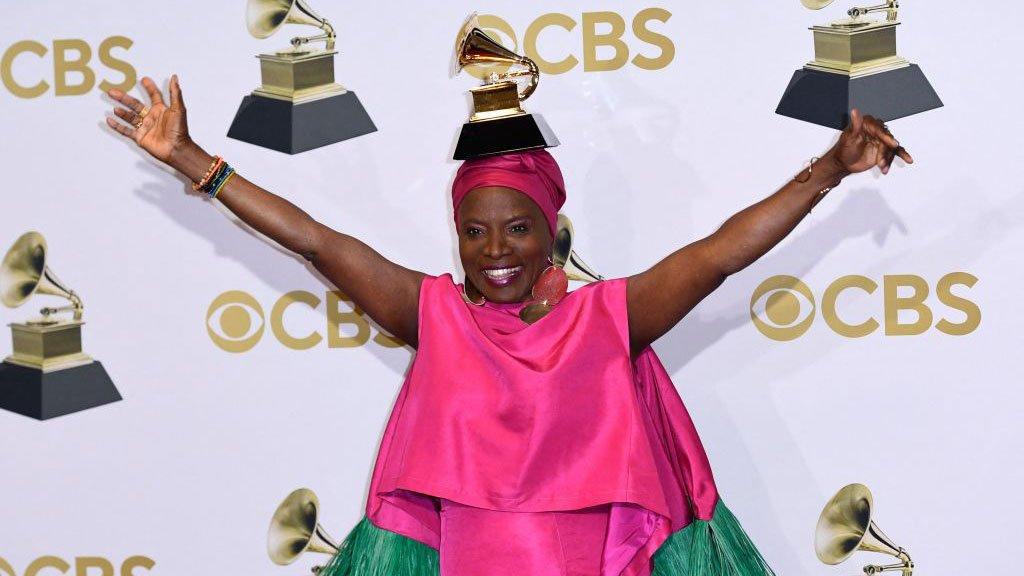
news
10 African GRAMMY Winners Through The Years: From Miriam Makeba To Angélique Kidjo & Burna Boy
At the 2024 GRAMMYs, five nominees are up for the inaugural Best African Music Performance category. Yet this is not the first time African artists have been highlighted at Music's Biggest Night — the continent has produced GRAMMY winners since the ‘60s.
At the 2024 GRAMMYs on Feb. 4, history will be made for an entire continent.
African musicians will finally have a competition to call their own, with the inaugural Best African Music Performance category. GRAMMY winner Burna Boy will go head-to-head with fellow Afrobeats superstars Asake and Davido, as well as rising pop singers Ayra Star of Nigeria and Tyla of South Africa.
But the 66th GRAMMY Awards is far from the first time Africans have been honored during Music's Biggest Night. African musicians have been taking home golden gramophones since the 1960s, when South African Miriam Makeba won Best Folk Album for her duo with Harry Belafonte. Since then, desert blues bands from the Sahara, extraordinary singers from Senegal and Cape Verde, pop divas from Nigeria and Benin, and a superstar DJ from South Africa have earned trophies in various categories.
Read on for a history of notable GRAMMY winners from Africa, whose works run the gamut of styles, traditions and categories.
Miriam Makeba (South Africa)
Best Folk Recording (with Harry Belafonte) - 1966
Before singer Mariam Makeba won a GRAMMY for An Evening with Belafonte/Makeba, a collaborative record with her mentor Harry Belafonte, an African artist had never won a thing at the GRAMMYs. That the singer had done this while fighting the apartheid regime of South Africa in exile — and amid the civil rights movement in the United States — makes it all the more revolutionary.
Born in the segregated township of Prospect near Johannesburg in 1932 to a Xhosa father and a Swazi mother, Makeba sang in choirs as a child and gravitated towards a musical career. A part in the anti-apartheid film Come Back, Africa rocketed her to fame in the U.S. and UK, and she traveled to New York and London, performing Xhosa-language folk songs like "Pata Pata" and "Qongqothwane." In London she met Belafonte, who helped her career get started in the United States.
In 1960, Makeba’s anti-Apartheid activities caught up with her when she was banned from reentering South Africa, forcing her into exile in America. She balanced her musical career with activism, speaking out against Apartheid and integrating protest into records such as Belafonte/Makeba. The album featured the two singing folk songs from across Africa in languages such as Swahili and Zulu, several with explicitly anti-Apartheid themes.
Though Makeba fell out of favor with white American audiences in the late ‘60s due to close ties with the Black Power movement — she married Black Panther associate Stokely Carmichael (later Kwame Ture) in 1968, leading to a de facto media boycott and surveillance by the CIA and FBI — she continued to perform internationally and protest the South African regime. As Apartheid finally fell in 1990, a newly-freed Nelson Mandela arranged for her homecoming.
Sade (Nigeria/UK)
Best New Artist - 1986
Born in Ibadan, Nigeria to a Yoruba-ancestry father and an English mother, Helen Folasade Adu had studied fashion in London before becoming the vocalist and face of the band that bears her name, Sade. The jazzy, soulful sophisti-pop on their 1985 record Promise earned instant acclaim, reaching No. 1 on the Billboard 200. Multiple GRAMMYs followed, starting with a Best New Artist award in 1986.
The group earned eight additional nominations throughout their career and won another three, including Best R&B Performance by a Duo or Group with Vocal for "No Ordinary Love" and Best Pop Vocal Album for Lovers Rock. But their influence — especially that of the famously reclusive singer Adu — resonates beyond awards. Beyoncé, FKA twigs, Frank Ocean, Drake and many others have been influenced by or paid tribute to this iconic force in music.
Ali Farka Touré (Mali)
Best World Music Album - 1994
Raised in the town of Niafunké on the edge of the Sahara not far from Timbuktu, Ali Ibrahim Touré was always a bit stubborn, hence his nickname "Farka" (Donkey). It was this headstrong nature that led him to music — his parents frowned upon his musical ambitions, but he defied them, building his own musical instruments.
If Ali Farka Touré had listened to his parents, he may never have become the godfather of desert blues, the guitar-driven genre that has taken over North Africa. After traveling throughout his home country of Mali, absorbing the different cultures within, Touré went abroad and heard American blues music for the first time, specifically John Lee Hooker, noticing the similarities between his African tunes and the music made by those whose ancestors had been taken from the continent. He began to hit upon a style that fuses his African influences with those from across the Atlantic.
Touré once surmised "My music is older than the blues," and became a crucial influence on generations of desert blues musicians to come, including Tinariwen, Mdou Moctar, and his own son and fellow musician Vieux Farka Touré. His pioneering sound would bring him two GRAMMYs for Best World Music Album in his lifetime, the first in 1994 for the collaborative record Talking Timbuktu with Ry Cooder, and the second in 2005 for In the Heart of the Moon. In 2010, he was posthumously awarded a golden gramophone for Best Traditional World Music Album, for Ali and Toumani.
Before his death in 2006, he became mayor of Niafunké and used the money he earned from his music to build roads, sewers, and a generator for the town.
Cesária Évora (Cape Verde)
Best Contemporary World Music Album - 2004
Hailing from the former Portuguese colony of Cape Verde off the western coast of Africa, Cesária Évora grew up in poverty and began singing as a child. Starting off as a club singer in the port city of Mindelo, she gained fame as the "Barefoot Diva," performing without shoes in tribute to the poor. It was her voice, however, that made her an international star, representing her small island nation by singing in Portuguese-derived Cape Verdean Creole and popularizing the melancholic, fado and blues-derived genre of morna.
Évora had already spent years performing around the world — despite considerable discomfort with stardom — by the time her album Voz d’Amor won Best Contemporary World Music Album at the 2004 GRAMMYs. Évora continued to live in Cape Verde even after becoming famous until her death in 2011 at age 70.
Youssou N’Dour (Senegal)
Best Contemporary World Music Album - 2005
Youssou N’Dour, a legendary vocalist from Senegal, had been made famous in the West for his work on Peter Gabriel’s "In Your Eyes" and the Neneh Cherry collab "7 Seconds." He had also worked on Paul Simon’s Album Of The Year-winning Graceland alongside South Africans Ladysmith Black Mambazo (which won two GRAMMYs before N’Dour even received his first).
But in 2005, he made history as Senegal’s first GRAMMY winner. N’Dour had been nominated three times for Best World Album and once for Best Contemporary World Music Album, finally winning the latter category that year for his album Egypt. (The Sufi-inspired record also earned Egyptian producer Fathy Salama his country’s first GRAMMY).
The GRAMMY Award was simply the capstone on a long, illustrious career. Born into a griot family in Dakar, telling stories through music was in N’Dour’s blood. In the late 1970s he gained massive acclaim locally as lead vocalist for the band Etoile de Dakar, which pioneered the mbalax genre by blending Afro-Latin dance music with traditional local rhythms. His soaring voice wouldn’t stay confined to his homeland for long as his work with Gabriel in 1986 lifted him to international stardom. Unlike many Francophone-African stars, he stayed in Senegal after breaking through and lives there to this day.
Angélique Kidjo (Benin/France)
Best Contemporary World Music Album - 2008
Originating from French-speaking Benin and now living in France, Angélique Kidjo
is the most GRAMMY-winning African musician in history. Her five trophies — starting in 2008 with a Best Contemporary World Music Album for Djin Djin — include three Best World Music Album wins and, most recently, a Best Global Music Album award for Mother Nature, which featured collaborations with Burna Boy, Mr. Eazi, and other new-gen African pop acts.
But more than being a GRAMMYs juggernaut, Kidjo is a grand dame of African music and a matriarchal figure for African musicians. After fleeing Benin for Paris in 1983, she signed with Island Records and rose to international acclaim in the early ‘90s thanks to dance-pop hits such as "Batonga" and "Agolo." Her album Fifa from 1996 saw her return to Benin, working with percussionists throughout the country.
Her many records since have seen her broaden her musical horizons, exploring African American music in a trilogy of LPs, giving a full-album tribute to salsa icon Celia Cruz, and even reinterpreting Talking Heads’ African-influenced record Remain in Light. Fluent in five languages — including French, English, Yoruba and Fon — Kidjo communicates across the musical world, working with everyone from Carlos Santana and Ziggy Marley, to Tony Allen, Gilberto Gil, and members of Vampire Weekend.
RedOne (Morocco)
Best Dance/Electronic Album - 2010
Born in the mountainous city of Tétouan in northern Morocco, Nadir Khayat moved to Sweden to pursue a career in pop music at age 19, lured by the likes of ABBA and Europe. Taking the production alias RedOne, he experienced limited success with artists like the A*Teens, but it wasn’t until he decamped to Jersey City in 2007 that he met the artist who would define his career and win him his GRAMMYs: a little-known pop singer calling herself Lady Gaga.
Khayat ended up producing six tracks on Gaga’s debut record The Fame, including her breakthrough hit "Just Dance" — that’s his name you hear her shout at the beginning of the song, by the way. The bombastic, maximalist sound of "Just Dance," "Poker Face," "LoveGame," and Fame Monster tracks like "Bad Romance" and "Alejandro" would conquer the charts, and the GRAMMYs.
At the 2010 GRAMMYs, The Fame won Best Dance/Electronic Album and "Poker Face" won Best Dance Recording; the next year, The Fame Monster earned Best Pop Vocal Album. Both LPs received Album Of The Year nods and "Poker Face" was nominated for Record and Song Of The Year. RedOne also earned a Moroccan Royal Award from King Mohamed VI in 2011; Though he hasn’t gotten a GRAMMY nod since 2012, few producers have had a run like he did.
Tinariwen (Mali/Algeria/Libya)
Best World Music Album - 2012
Just a year after Ali Farka Touré earned his final, posthumous GRAMMY, the desert blues band Tinariwen earned their first: Best World Music Album for their LP Tassili. The path they took to get there, however, was far more complicated than Farka’s, involving rebellion, war, and displacement.
Tinariwen’s members hail from the nomadic Tuareg people of the Sahara, whose frequent battles for independence have continued since the 1960s. Since forming in the 1980s the band’s music-making activities have been interrupted by rebellions against various North African governments, with some of the members even joining the fight. Featuring lyrics about the Tuareg people and their struggle for self-determination, Tinariwen's songs were traded on cassettes across North Africa.
In the 2000s, they began to release music in the West, first via 2001's The Radio Tisdas Sessions and have since earned acclaim from the global music community. Along with their 2012 win for Tassili, two more of their albums have been nominated: Elwan in 2017 and Amadjar in 2020. They’ve also worked with international musicians such as Mark Lanegan and Daniel Lanois.
That international acclaim has unfortunately come amid further danger at home. The group were exiled from Mali during the early 2010s Tuareg anti-government rebellion, with particular threats coming from Islamist militants Ansar Dine. Conflict is sadly still a part of life for many desert blues artists; in 2023 the Niger-based Mdou Moctar and his band were unable to return from a U.S. tour due to a military coup d’état in their home country.
Burna Boy (Nigeria)
Best Global Music Album - 2021
Femi Kuti, King Sunny Adé, Babatunde Olatunji, and his rival WizKid had all received GRAMMY nods before Burna Boy became the first Nigerian male artist to grab a golden gramophone for an original work. The Afrobeats megastar earned the prize for Best World Music Album in 2021 for his album Twice as Tall.
At the 66th GRAMMY Awards, Burna Boy has gathered four nominations — a career record. His "City Boys" is nominated in the first-ever Best African Music Performance category. His record I Told Them… earned a slot in Best Global Music Album, and two other songs from the album also got nominations: Best Global Music Performance for "Alone" and Best Melodic Rap Performance for the 21 Savage collab "Sittin’ On Top of the World."
Black Coffee (South Africa)
Best Dance/Electronic Album - 2022
Before Black Coffee’s album Subconsiously won Best Dance/Electronic Album at the the 2022 GRAMMYs — the first African to win the category for an original project — most of South Africa’s winners were vocal performers like Ladysmith Black Mambazo and the Soweto Gospel Choir. The DJ/producer’s victory represents a shift around ideas of what African musicians are capable of, from traditional genres and folk music to the high-tech world of electronic dance music.
That success hasn’t necessarily come easy for the musician, born Nkosinathi Innocent Maphumulo in KwaZulu Natal province. In 1990 while celebrating Nelson Mandela’s release from prison, Maphumulo lost the use of his left arm in a car accident. Disability didn’t deter him from pursuing a music career, and by the mid-2000s he had become celebrated in his home country for helping develop Afro house, blending the international house music sound with influences from kwaito, mbaqanga, and other South African genres and sounds.
Today, Black Coffee is one of the most sought-after house DJs in the world, but back home in SA and across Africa, it’s the sultry sound of Amapiano, an Afro-House offshoot, that reverberates in clubs and at festivals today. A new generation of talent have embraced the smooth genre, from pop princess Tyla and producer/DJ Musa Keys to Nigerian Afrobeats stars like Davido and Asake, all of whom have nods at this year’s GRAMMYs.
Here Are The Nominees For Best African Music Performance At The 2024 GRAMMYs
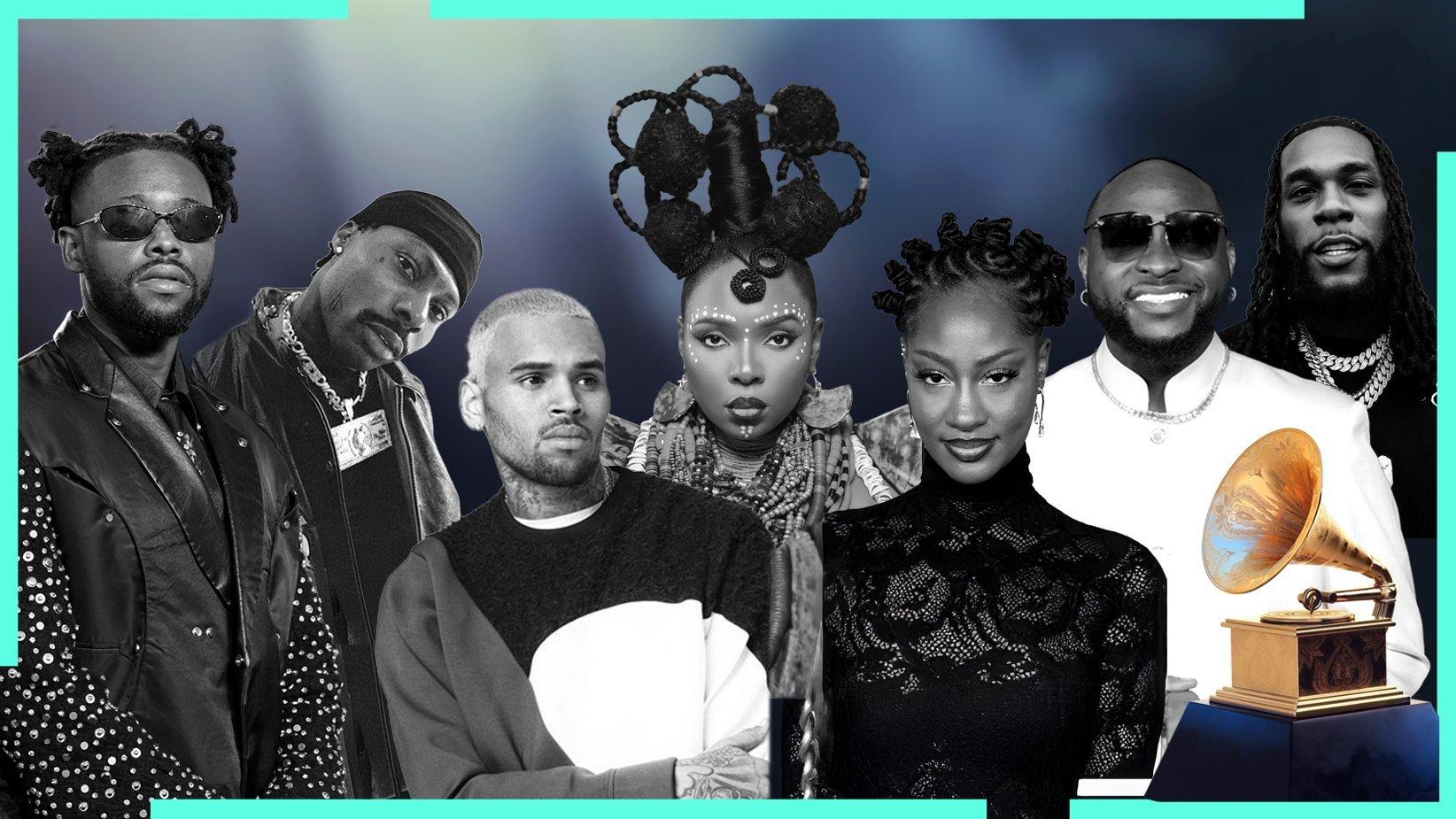
list
2025 GRAMMYs Nominations: Best African Music Performance Nominees
Burna Boy, Yemi Alade, Asake & Wizkid, Tems, and Chris Brown featuring Davido and Lojay are nominees in the second annual Category.
Earlier this year, the Recording Academy made history by awarding their first-ever GRAMMY Award for Best African Music Performance. Never before had the continent’s vibrant musical culture been given a category all their own, and the best and brightest from the African music industry stepped up to receive nominations.
The eventual victor was 22-year-old South African singer Tyla, whose bewitching song "Water" earned the hearts of GRAMMYs voters, as well as millions of listeners that boosted the song to the Billboard Hot 100. She became the first South African in 55 years to make the chart.
Read more: 10 African GRAMMY Winners Through The Years: From Miriam Makeba To Angélique Kidjo & Burna Boy
This year, Tyla will not defend her prize. But five fantastic songs from a multitude of artists, including one high-profile American that has joined up with two Afrobeats stars, will compete for the Golden Gramophone. Check out the nominees below and read the full 2025 GRAMMYs nominations list ahead of Music's Biggest Night on Sunday, Feb. 2, 2025.
Yemi Alade — "Tomorrow"
One of African pop music’ biggest stars, Yemi Alade would be a legend even without a GRAMMY nod. She first rose to fame a decade ago thanks to continental hits like "Johnny" and "Oh My Gosh" with Rick Ross. In July, she took her sound to new heights on Rebel Queen, an album incorporating genres such as highlife and dancehall for a global celebration of Black music that solidifies her reputation as "Mama Africa."
"Tomorrow," the GRAMMY-nominated song from the album, is a triumphant, bright amapiano tune, the latest result of Alade’s flirtation with the genre. Produced by Yasso and incorporating choral vocals, the lyrics in English and Nigerian Pidgin assert the singer’s unflappable confidence and self-belief. "I dance away my sorrow," she sings, "Rain or shine, I’ll be shining like a diamond."
"Tomorrow" marks the legendary artist’s first-ever GRAMMY nomination, but whether or not she grabs the golden gramophone, it’s clear from her song that nothing will phase this Rebel Queen.
Burna Boy — "Higher"
Burna Boy is such an undisputed force in African music, it’s not surprising for him to be nominated in this Category two years in a row. Already a GRAMMY winner for Best Global Music Album (Twice As Tall took the prize in 2021), his bold, American R&B-inspired "City Boys" earned a Best African Music Performance nod last year and was among a medley of tracks Burna performed on the GRAMMY stage. The braggadocious hip-hop song ultimately fell to Tyla’s "Water," however.
The success of his 2023 album I Told Them may have put Burna Boy in a more contemplative state of mind, because "Higher," his current nominated track, is a much more conscious effort. Over a mellow, amapiano-inspired beat from producer Yo Dibs, Burna reflects on his limited time on Earth and the harshness of daily life: "You know say streets don't love you rara / It's full of snakes and spiders / Make a wrong move, lose your life / Make it hard for your mother to sleep at night."
The song’s video, conceptually similar to Drake’s visual for "God’s Plan," shows the singer making an emotional visit to his hometown of Port Harcourt and distributing aid with his charity group Project PROTECT. It seems that magnanimity has already been rewarded: The song gained 1.3 million streams on Spotify in its first day of release, a new record for an African artist, and its video has been viewed over 7.3 million times as of this writing.
Chris Brown — "Sensational" feat. Davido & Lojay
It can’t be denied that Chris Brown is something of a survivor in the music industry. The GRAMMY winner for Best R&B Album (F.A.M.E.) is as famous for his hits — from "Run It!" and "Kiss Kiss," to "Look at Me Now" and "No Guidance" — as he is infamous for his checkered past.
Now he’s back in the GRAMMY spotlight with a single from his 2023 album 11:11. "Sensational" marks a bold stylistic pivot for the R&B singer as he adopts Afrobeats for a slick song that could be called, well, "breezy." Adding some African bona-fides, he’s recruited Davido — one of the genre’s most important acts and a GRAMMY nominee last year in this Category — as well as rising artist Lojay, for feature verses. The result is a transatlantic collab that makes the case that Americans can take on African genres too, with a little help from their continental friends.
Asake & Wizkid — "MMS"
In just a few short years, Asake has established himself as one of the most creative and charismatic new talents in Afrobeats. His 2023 record Work of Art blended the globally-aspirational Nigerian pop sound with South African house offshoot amapiano and the indigenous Yoruba genre fújì; Asake earned a GRAMMY nod in this category for album single "Amapiano" last year.
Asake isn’t one to rest on his laurels, however. He dropped another record, Lungu Boy, earlier in 2024, for which he switched up his sound further and recruited global stars like Stormzy, Central Cee, and Travis Scott. Single "MMS" keeps things refreshingly local in terms of guest spots, recruiting GRAMMY-winner Wizkid for the feature. Incorporating the same Yoruba-language choral vocals Asake used throughout his last album, he trades verses with Wiz over a glamorous, jazz-inflected, ‘90s R&B-inspired beat by P.Priime. The lyrics, in English, Yoruba, and Nigerian Pidgin, narrate Asake’s journey to finding his signature sound and letting fate determine his path. It’s a classy, reflective song from a pair of Africa’s biggest stars.
Tems — "Love Me JeJe"
Tems is already a GRAMMY winner and the first African artist to top the Billboard Hot 100, all thanks Future sampling her song "Higher" on his hit "Wait For U." Yet 2024 was the year in which the Nigerian artist stepped into her own spotlight, finally releasing her debut album Born in the Wild. Its single "Love Me JeJe" hit No. 1 on the UK Afrobeats charts and No. 3 on Billboard’s U.S. Afrobeats Songs.
Interpolating an identically-titled 1997 hit from Seyi Sodimu that’s regarded as an African pop classic, "Love Me JeJe" is an Afrobeats tune as tender as the Pidgin phrase that makes up its title. Tems’ smooth, heartfelt vocals float over the track as she sings of her desire for unconditional, supportive love: "I need your lovin’, so fresh, so clean / Love me in and out, unfailingly / And I’ll be down now, anytime you call me."
Debuting the song during her set at Coachella 2024, it could be argued that "Love Me JeJe" was meant to provide American audiences with a bridge to African music, from its past icons to its present talents. With her GRAMMY nod for the song, it seems that Tems has done just that.
More News About African Music
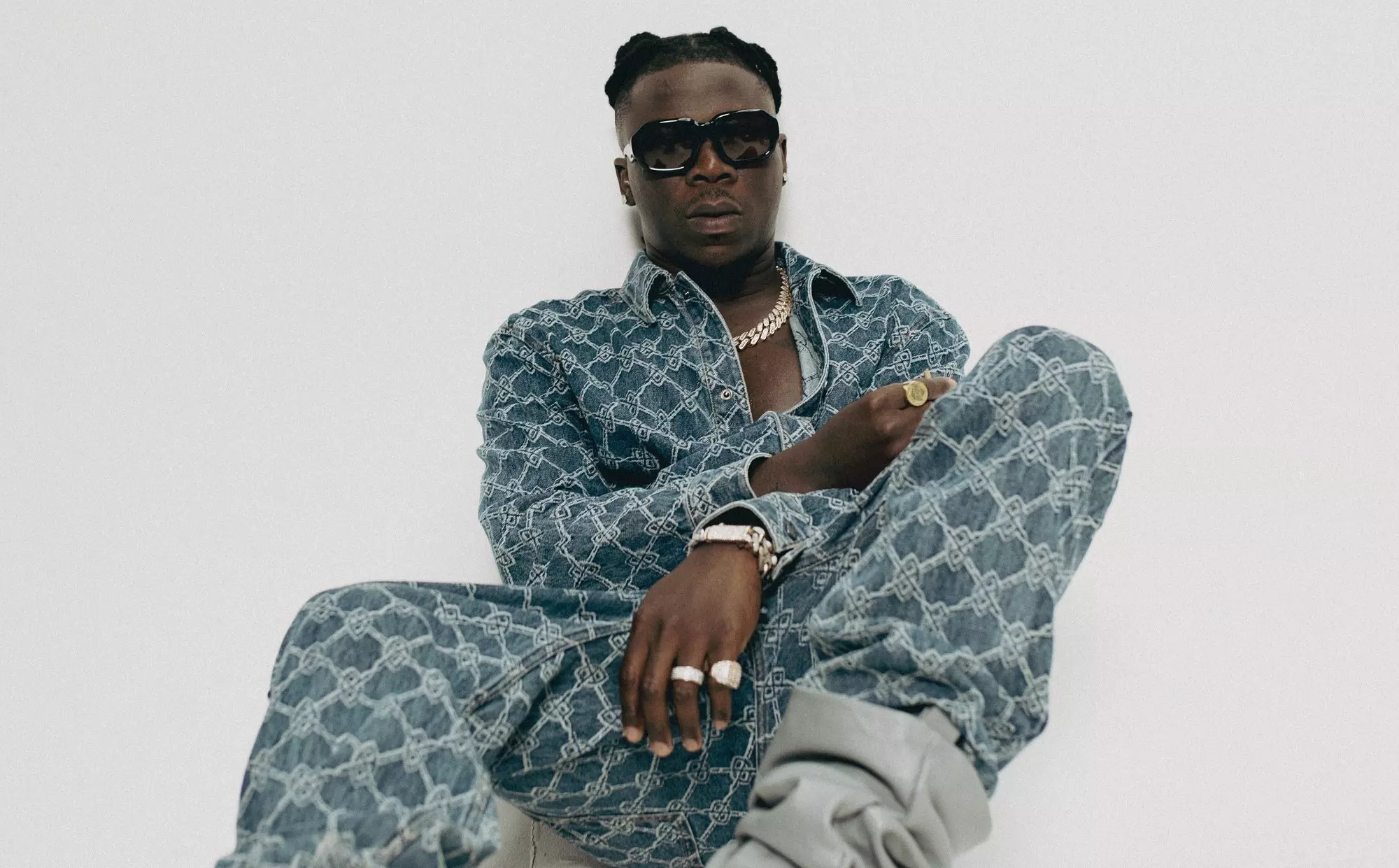
Stonebwoy On His "Inner Quest" To Showcase Authentic Ghanaian Sound

Mic Monsta Performs "Local Lokito" | Global Spin
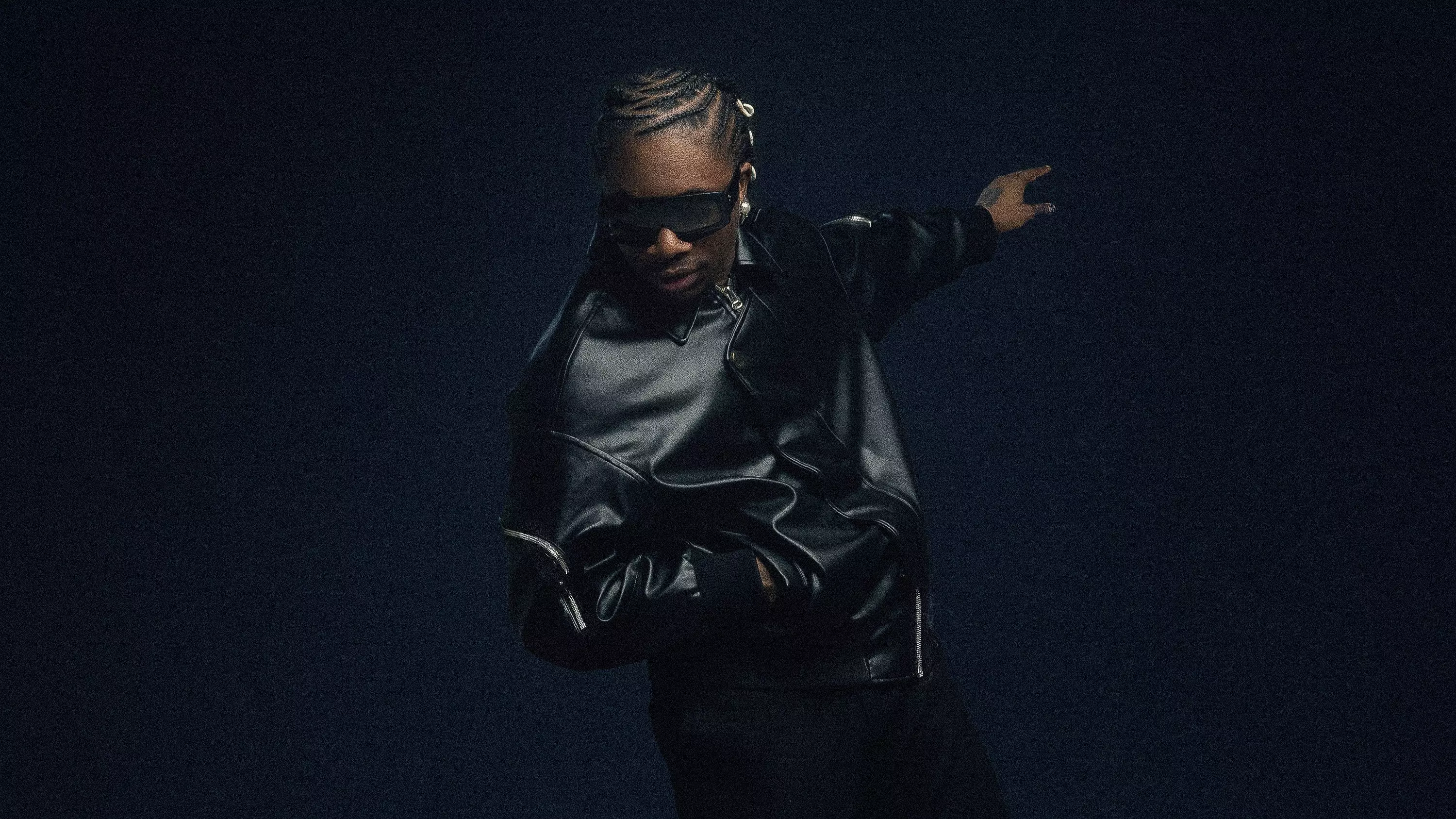
Rising Afrobeats Star Oxlade Is Ready To Go Global On 'Oxlade From Africa'
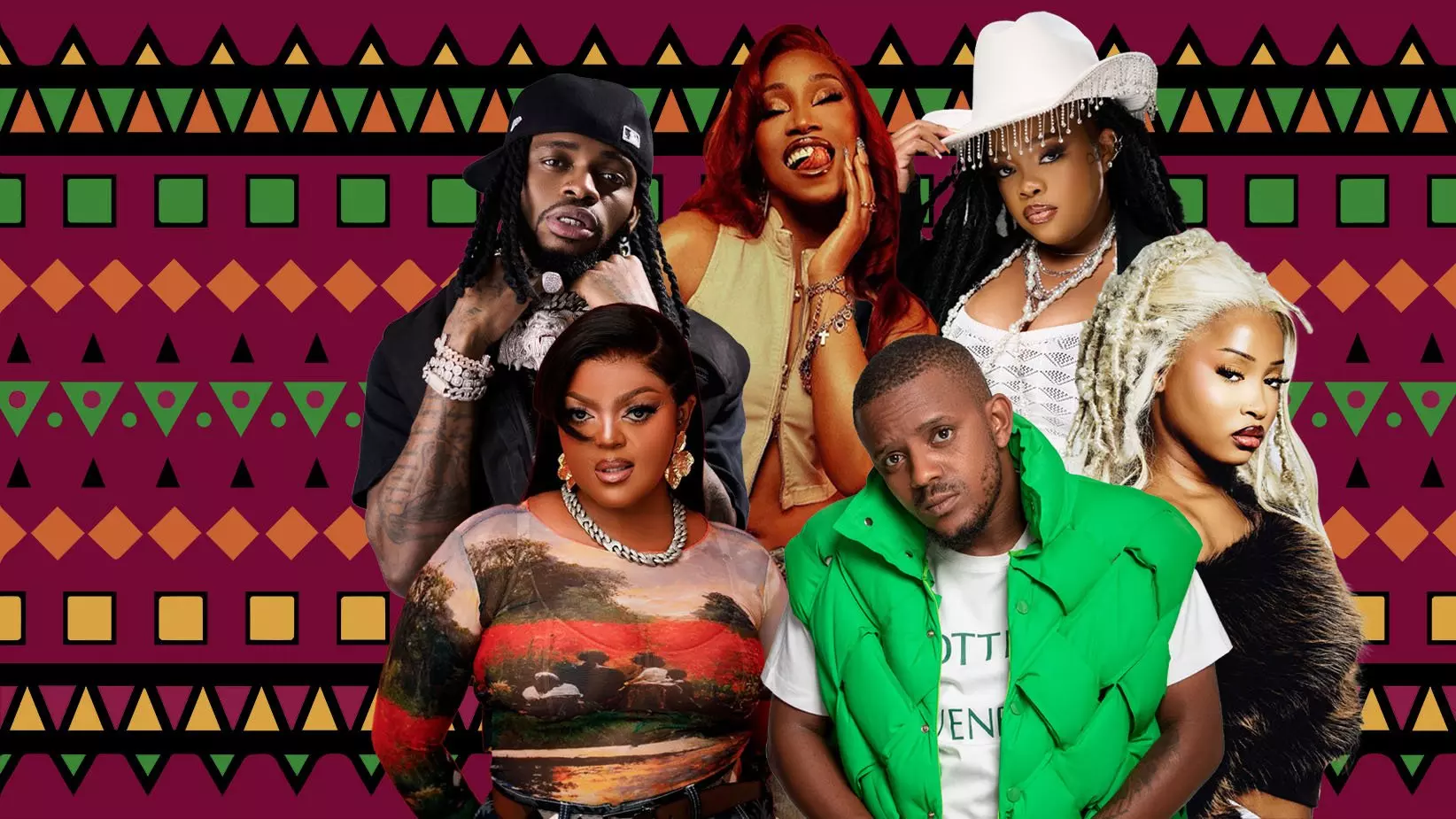
Amapiano's Decade-Long Journey To Global Dominance: The Sound Redefining Club Music Worldwide
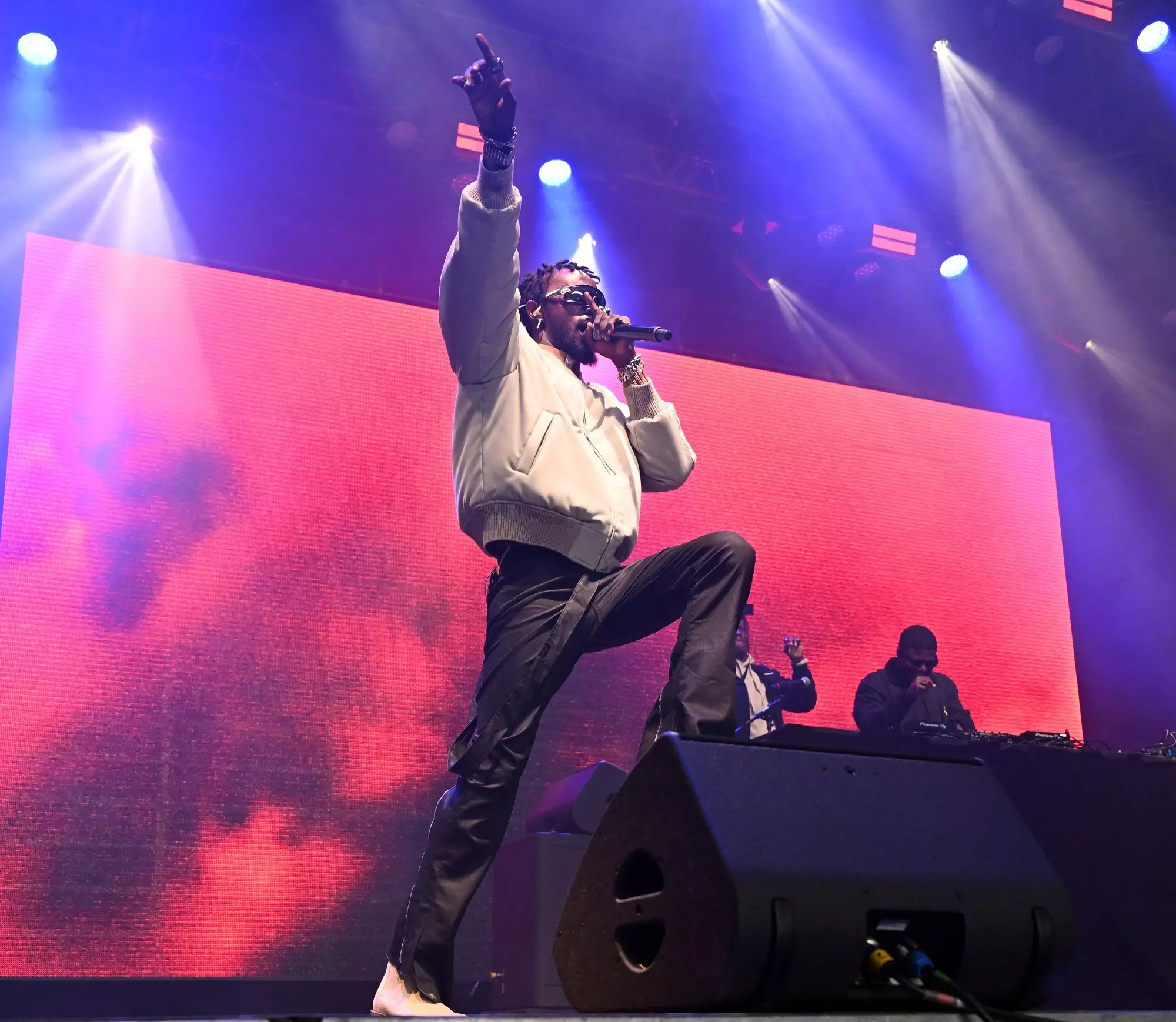
10 Artists Essential To Ghanaian Hiplife: Reggie Rockstone, Sarkodie, Mzbel & More
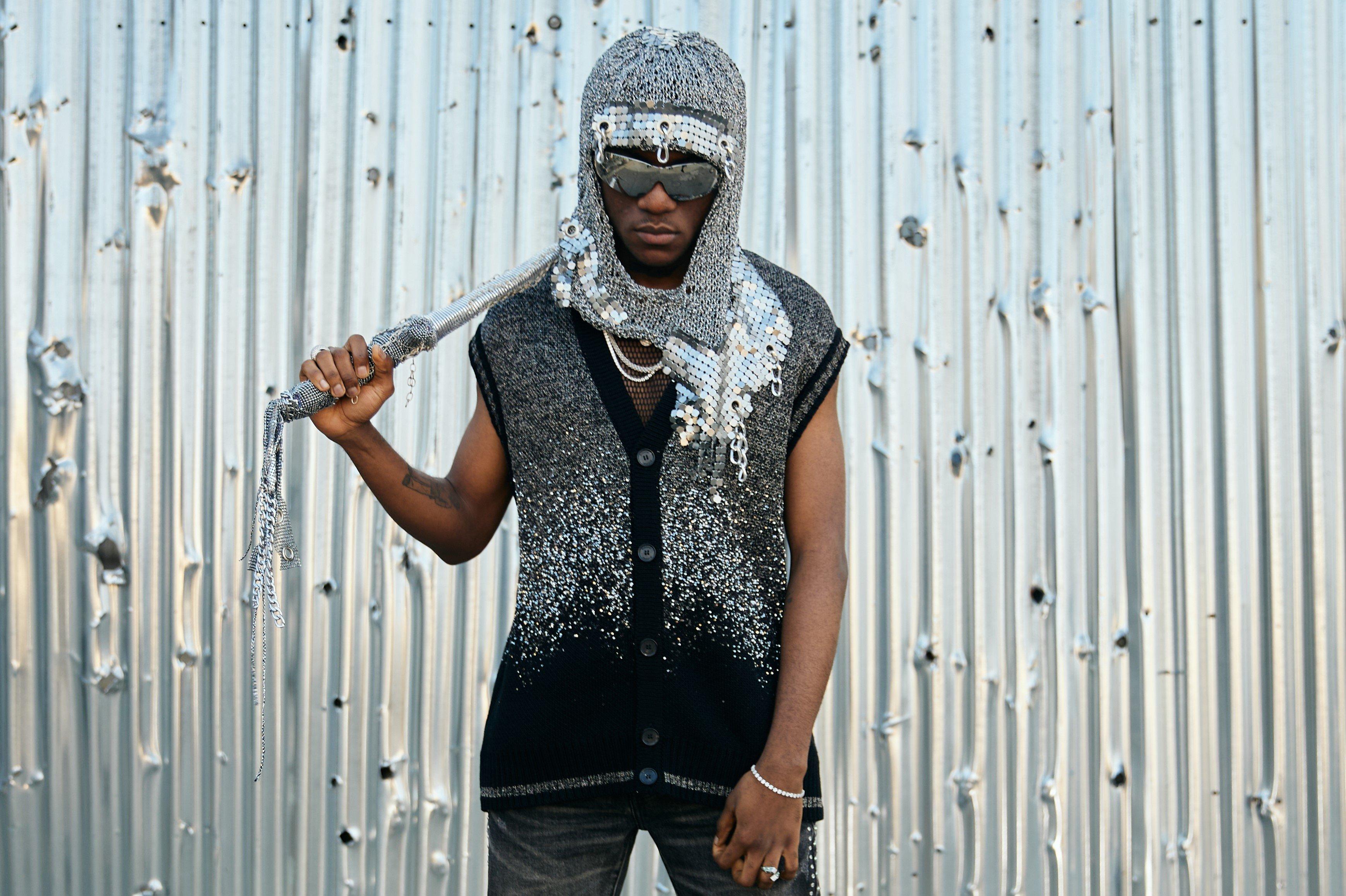
Photo: Shoakland
interview
Meet Victony: The Afrobeats Sensation Sharing Importance Of Being 'Stubborn'
Victony's debut album, 'Stubborn,' is just months old, but the young Afrobeats star is rising fast. Ahead of his first headlining U.S. tour, Victony detailed the creative process behind his new album and his predictions for the next year in Afrobeats.
To say that the past year has been an eventful one in the dynamic world of Afrobeats would be, at best, a gross understatement. The genre's list of global accolades has continued to swell in size, including multiple nominations at the 2024 GRAMMY Awards, expansive cross-border collaborations, and inaugural appearances on some of the world’s most coveted stages.
Simultaneously, Afrobeats has been undergoing something of an identity crisis, in which listeners have criticized sonic monotony and Western pandering of some artists. In the immediate wake of this criticism, as though on cue, came a slew of forward-thinking projects from the genre’s biggest stars, igniting the mainstream scene’s creative progression. Among these stars is 23-year-old Afrobeats sensation Anthony Ebuka Victor, known widely as Victony.
His debut album, Stubborn, is barely two months old yet has already received high acclaim from top Afrobeats pundits and laymen alike. Therein, Victony tells his life story for the first time, complete with vivid songwriting that delves into themes of childhood, romance, and dogged resilience. With features from Nigeria’s Asake and Shallipopi, as well as American acts Teezo Touchdown and Saint JHN, Stubborn's sonic meter explores Afrobeats with unending - and unmatched - innovation.
Victony, however, is no novice when it comes to putting out pristine bodies of work. His 2020 EP Saturn sounded nothing like a 19-year-old’s debut; singles “Jo Riddim” and “Space and Time” revealed serious sonic maturity. His subsequent EP Outlaw, which followed his breakout as the feature on Mayorkun’s “Holy Father,” included addictive hits “Apollo,” “Jolene,” and “Soweto.” The latter, of course, took the world by storm and led to a remix featuring Don Toliver and Rema, which peaked at No. 5 on the Billboard Afrobeats chart.
Between this, his debut on the ColorsxStudios platform, his assist on Burna Boy’s “Different Size,” and his record deal with the L.A.-based Encore Records, it is difficult to tell just when this young boy from Ojo, Lagos became a continental and global star. What’s more, he’s soon to push his story outside of Nigerian borders, kicking off his Stubborn North American tour on Aug. 6.
Ahead of this tour, Victony sat down with GRAMMY.com to discuss his creative process, the importance of telling his story, and all things Stubborn.
'Stubborn' features excellent songwriting about your life experiences, though it's not the first time you've done so. What makes 'Stubborn' different from the other work in your discography?
Stubborn has my story; it’s where I get to properly introduce myself. The [Outlaw] EP is like Yeah, this guy can sing, he knows all this Afrobeats stuff. Let’s put a good body of work together for people to enjoy. The Stubborn album is saying, This is Victony. This is where he’s from. This is what he’s about.
You’ve mentioned before that veteran Nigerian rapper Olamide encouraged you to make 'Stubborn' a full-length album as opposed to an EP. Had you been ready for an era shift at the time that you spoke to him?
I was prepared for an era shift, but my mind was just stuck on an EP because that was the plan since last year. Sometimes, you can’t even see what everything looks like when you’re really in it. You have to extract yourself from the situation and really look at it. But speaking to Olamide, once he mentioned the album, it felt possible. I was like, Why am I not even thinking about an album?
'Stubborn' is an incredible testament to resilience, but you also explore other themes like love and betrayal. What is the overarching message that you wanted the project to convey?
Resilience is the boldest statement that the project has. But within all that, there are other things that I’ve been through, like the stuff that you mentioned, that didn’t change me as a person.
I still have the ability to love, and I still have the ability to receive love. So obviously, that reflected in a few songs on the project because I still go through those emotions. I’m still human regardless of everything I've been through.
Your feature list is quite expansive — we have Shorae Moore, Shallipoppi, Saint JHN, Teezo Touchdown, and Asake. Did you have an idea of who you wanted on the project beforehand, or was your feature selection process more organic?
I’m always curious to see what this and this will sound like, or what doing this and this will look like. So I just make songs and think about who will be perfect on those songs. I didn’t think of it as, I want an album, who are the guest features?
One thing that the features all have is authenticity. These people have a voice, they have a style, they have something that they stand for. And that is something that Stubborn is also preaching — authenticity. So collaborating with these people helped to bring very interesting ideas to life. Because one wouldn’t ordinarily imagine a Victony and Asake feature, or a Victony and Teezo feature. But when somebody who is authentic collaborates with somebody who is authentic, something has to happen. We were just trying to create something, and I love creating.
Learn more: Meet The Latest Wave Of Rising Afrobeats Stars: AMAARAE, BNXN, Oladapo & More
You have a U.S. tour coming up which is extremely exciting. You’ve toured with Rema before, but this will be your first-ever solo tour. How are you feeling?
I’m actually very excited. We’ve been planning what we want the tour to feel like, because it’s important to think about the feeling that you want to leave people with. I think that this tour is the biggest opportunity to showcase what the album is really about. Having to go on stage, perform for an hour plus. I don’t think I've ever done that nine times in a row in nine cities. So we’re planning everything to make that all come to life.
What do you want your U.S. audience to take away from your tour?
I want my U.S. audience to feel the essence of my journey and connect with my music. This tour is a journey through my experiences and my evolution as an artist. You'll get the party anthems as well as the soul-stirring ballads. I want them to leave each show thinking, This is what that Victony guy is about: raw talent, authenticity, and a sound that resonates deeply.
Give us your Afrobeats predictions for the year — what should we expect from the scene?
I just feel like it’s about to be a madhouse. Tems just dropped, Ayra Starr just dropped, Ruger & BNXN just dropped. And Wizkid is yet to drop, Davido is yet to drop, Fireboy DML is yet to drop. I don’t think we’ve had a year like this. Ever. It’s like everybody is dropping a project this year.
Read more: Tems On How 'Born In The Wild' Represents Her Story Of "Survival" & Embracing Every Part Of Herself
My prediction is that this is the start of something for Afrobeats. Before now, what people would tell you is that Afrobeats artists all share one fanbase. But everything is about to change because of the volume of music coming out. It’s going to really push structure with the fans.
Looking back from your debut EP to the present day, what comes to mind? Did you foresee yourself becoming what you are now?
I always knew that everything that’s currently happening would happen. I just didn’t know what was going to make it happen. I didn’t know that this was the direction. It’s been interesting because at one point, you just have life experiences that influence your art, and then the direction changes. That’s what it’s been for me because I like my art to reflect who I am at any given time.
So, who knows what’s going to happen next? After Saturn, I didn't foresee my story changing. And now new experiences have come, and those have also changed me. I don’t know what’s going to happen next, but one thing’s for sure, the journey is just beginning. I’m excited to see where this path leads and to continue sharing my story with the world.
More News About African Music

Stonebwoy On His "Inner Quest" To Showcase Authentic Ghanaian Sound

Mic Monsta Performs "Local Lokito" | Global Spin

Rising Afrobeats Star Oxlade Is Ready To Go Global On 'Oxlade From Africa'

Amapiano's Decade-Long Journey To Global Dominance: The Sound Redefining Club Music Worldwide

10 Artists Essential To Ghanaian Hiplife: Reggie Rockstone, Sarkodie, Mzbel & More
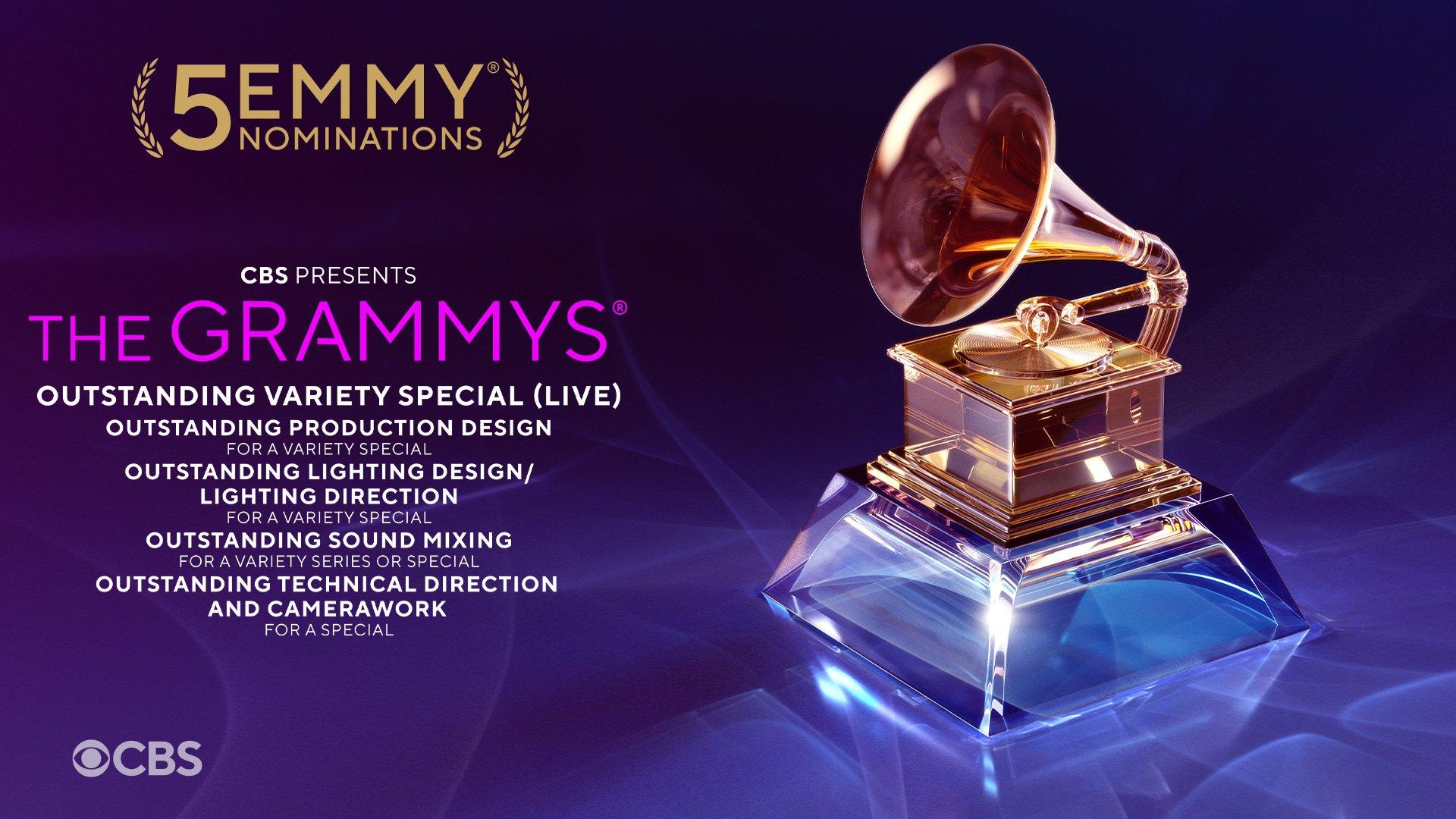
Graphic Courtesy of CBS
news
The 2024 GRAMMYs Have Been Nominated For 5 Emmys: See Which Categories
The 2024 GRAMMYs telecast is nominated for Outstanding Variety Special (Live), Outstanding Production Design For A Variety Special, and three more awards at the 2024 Emmys, which take place Sunday, Sept. 15.
It’s officially awards season! Today, the nominees for the 2024 Emmys dropped — and, happily, the 2024 GRAMMYs telecast received a whopping five nominations.
At the 2024 Emmys, the 2024 GRAMMYs telecast is currently nominated for Outstanding Variety Special (Live), Outstanding Production Design for a Variety Special, Outstanding Lighting Design/Lighting Direction for a Variety Special, Outstanding Sound Mixing for a Variety Series or Special, and Outstanding Technical Direction and Camerawork for a Special.
Across these categories, this puts Music’s Biggest Night in a friendly head-to-head with other prestigious awards shows and live variety specials, including the Super Bowl LVIII Halftime Show starring Usher as well as fellow awards shows the Oscars and the Tonys.
2024 was a banner year for the GRAMMYs. Music heroes returned to the spotlight; across Categories, so many new stars were minted. New GRAMMY Categories received their inaugural winners: Best African Music Performance, Best Alternative Jazz Album and Best Pop Dance Recording. Culture-shaking performances and acceptance speeches went down. Those we lost received a loving farewell via the In Memoriam segment.
The 2025 GRAMMYs will take place Sunday, Feb. 2, live at Crypto.com Arena in Los Angeles and will broadcast live on the CBS Television Network and stream live and on demand on Paramount+. Nominations for the 2025 GRAMMYs will be announced Friday, Nov. 8, 2024.
For more information about the 2025 GRAMMY Awards season, learn more about the annual GRAMMY Awards process, read our FAQ (Frequently Asked Questions) section, view the official GRAMMY Awards Rules and Guidelines, and visit the GRAMMY Award Update Center for a list of real-time changes to the GRAMMY Awards process.
2025 GRAMMYs: Meet The Nominees
2025 GRAMMYs: See The OFFICIAL Full Nominations List
Watch The 2025 GRAMMY Nominations Announcement Now
2025 GRAMMYs Nominations: Album Of The Year Nominees
2025 GRAMMYs Nominations: Song Of The Year Nominees
2025 GRAMMYs Nominations: Best New Artist Nominees
2025 GRAMMYs Nominations: Record Of The Year Nominees
2025 GRAMMYs Nominations: Producer Of The Year Nominees
2025 GRAMMYs Nominations: Songwriter Of The Year Nominees
2025 GRAMMY Nominations: See Shaboozey, Anitta, Teddy Swims & More Artists' Reactions
Beyoncé & Taylor Swift Break More GRAMMY Records, Legacy Acts Celebrate Nods & Lots Of Firsts From The 2025 GRAMMY Nominations
2025 GRAMMYs Nominations: Best African Music Performance Nominees
Who Are The Top GRAMMY Awards Winners Of All Time? Who Has The Most GRAMMYs?
How Much Is A GRAMMY Worth? 7 Facts To Know About The GRAMMY Award Trophy
The Impact Of A GRAMMY Win: Life After The Award
2025 GRAMMYs To Take Place Sunday, Feb. 2, Live In Los Angeles; GRAMMY Awards Nominations To Be Announced Friday, Nov. 8, 2024
GRAMMY Awards Updates For The 2025 GRAMMYs: Here's Everything You Need To Know About GRAMMY Awards Categories Changes & Eligibility Guidelines
Recording Academy Renames Best Song For Social Change Award In Honor Of Harry Belafonte
The Recording Academy Adds More Than 3,000 Women GRAMMY Voters Since 2019, Surpassing Its 2025 Membership Goal
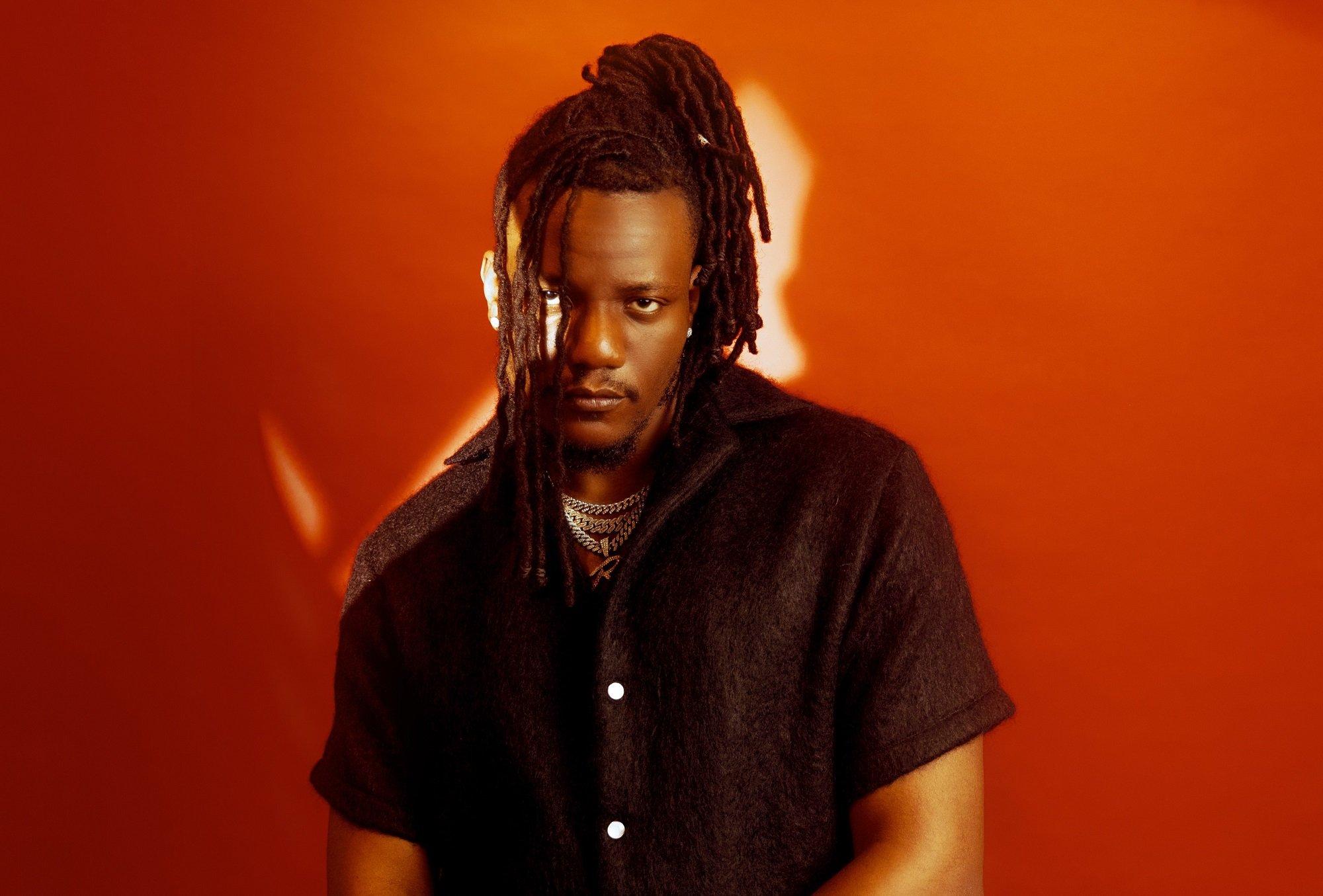
Photo: Williams Peters
interview
Meet Usher Collaborator Pheelz, The Nigerian Producer & Singer Who Wants You To 'Pheelz Good'
After working with Usher on two tracks for his latest album, 'Coming Home,' Lagos' Pheelz is looking inward. His new EP, 'Pheelz Good II' drops May 10 and promises to be an embrace of the artist's unabashed self.
If you were online during the summer of 2022, chances are you’ve heard Pheelz’s viral hit single "Finesse." The swanky Afro-fusion track (featuring fellow Nigerian artist Bnxn) ushered in a world of crossover success for Pheelz, who began his career as a producer for the likes of Omah Lay, Davido, and Fireboy DML.
Born Phillip Kayode Moses, Pheelz’s religious upbringing in Lagos state contributed to his development as a musician. He manned the choir at his father’s church while actively working on his solo music. Those solo efforts garnered praise from his peers and music executives, culminating in Pheelz's debut EP in 2021. Hear Me Out saw Pheelz fully embrace his talent as a vocalist, songwriter, and producer.
"I feel important, like I’m just molding clay, and I have control over each decision," Pheelz tells GRAMMY.com about creating his own music.
2022 saw the release of the first two tapes in his Pheelz Good trilogy: Pheelz Good I and Pheelz Good (Triibe Tape), which was almost entirely self-produced. The 29-year-old's consistency has paid off: he produced and sang on Usher’s "Ruin," the lead single from his latest album Coming Home, and also produced the album's title track featuring Burna Boy. But Pheelz isn't only about racking up big-name collaborators; the self-proclaimed African rockstar's forthcoming projects will center on profound vulnerability and interpersonal honesty. First up: Pheelz Good II EP, out May 10, followed by a studio album in late summer.
Both releases will see the multi-hyphenate "being unapologetically myself," Pheelz tells GRAMMY.com. "It will also be me being as vulnerable as I can be. And it’s going to be me embracing my "crayge" [crazy rage]...being myself, and allowing my people to gravitate towards me."
Ahead of his new project, Pheelz spoke with GRAMMY.com about his transition from producer artist, designing all his own 3D cover art, his rockstar aesthetic, and what listeners can expect from Pheelz Good II.
This interview has been edited for clarity.
What sparked your transition from singing in church to realizing your passion for creating music?
For me, it wasn’t really a transition. I just always loved making music so for me I felt like it was just wherever I go to make music, that’s where I wanna be. I would be in church and I was the choirmaster at some point in my life, so I would write songs for Sunday service as well. And then I would go to school as well and write in school, and people heard me and they would love it. And I would want to do more of that as well.
A friend of my dad played some of my records for the biggest producers in Nigeria back then and took me on as an intern in his studio. I guess that’s the transition from church music into the industry. My brothers and sisters were in the choir, but that came with the job of being the children of the pastor, I guess. None of them really did music like me; I’m the only one who took music as a career and pursued it.
You made a name for yourself as a producer before ever releasing your music, earning Producer Of The Year at Nigeria’s Headies Awards numerous times. What finally pushed you to get into the booth?
I’ve always wanted to get into the booth. The reason why I actually started producing was to produce beats for songs that I had written. I’ve always been in the booth, but always had something holding me back. Like a kind of subconscious feeling over what my childhood has been. I wasn’t really outspoken as a child growing up, so I wouldn’t want people to really hear me and would shy away from the camera in a sense. I think that stuck with me and held me back.
But then COVID happened and then I caught COVID and I’m like Oh my god and like that [snaps fingers] What I am doing? Why am I not going full steam? Like why do I have all this amazing awesomeness inside of me and no one gets to it because I’m scared of this or that?
There was this phrase that kept ringing in my head: You have to die empty. You can’t leave this earth with all of this gift that God has given you; you have to make sure you empty yourself. And since then, it’s just been back-to-back, which just gave me the courage.
How did you react to " Finesse" in former President Barack Obama’s annual summer playlist in 2022?
Bro, I reacted crazy but my dad went bananas. [Laughs.] I was really grateful for that moment, but just watching my dad react like that to that experience was the highlight of that moment for me. He's such a fan of Barack Obama and to see that his son’s music is on the playlist, it just made his whole month. Literally. He still talks about it to this day.
Experiences like that just make me feel very grateful to be here. Life has really been a movie, just watching a movie and just watching God work and being grateful for everything.
At first he [my dad] [didn’t support my career] because every parent wants their child to be a doctor, a lawyer, or an engineer. But when he saw the hunger [I have], and I was stubborn with [wanting] to do music, he just had to let me do it. And now he’s my number one fan.
Your latest single, "Go Low" arrived just in time for festival season. What was it like exploring the live elements of your art at SXSW and your headlining show in London at the end of April?
I have always wanted to perform live. I’ve always loved performing; Pheelz on stage is the best Pheelz. Coming from church every Sunday, I would perform, lead prayers and worship, so I’ve always wanted to experience that again.
Having to perform live with my band around the world is incredible man. And I’ll forever raise the flag of amazing Afro live music because there’s a difference, you know? [Laughs.] There are so many elements and so many rhythms and so many grooves
I’ve noticed that much of your recent cover art for your singles and EPs is animated or digitally crafted. What’s the significance, if any, of this stylistic choice?
It still goes back to my childhood because I wasn’t expressive as a child; I wouldn’t really talk or say how I felt. I’d rather write about it, write a song about it, write a poem about it, or draw about it. I’d draw this mask and then put how I’m feeling into that character, so if I was angry, the mask would be raging and just angry.
The angry ones were the best ones, so that stuck with me even after I started coming out of my shell and talking and being expressive; that act of drawing a mask still stuck with me. And then I got into 3D, and I made a 3D version of the mask and I made a 3D character of the mask. So I made that the main character, and then I just started making my lyric videos, again post-COVID, and making them [lyric videos] to the characters and making the actual video mine as well.
In the future, I’m gonna get into fashion with the characters, I’m gonna get into animation and cartoons and video games, but I just wanna take it one step at a time with the music first. So, in all of my lyric videos, you get to experience the characters. There’s a fight [scene] among them in one of the lyric videos called "Ewele"; there is the lover boy in the lyric video for "Stand by You"; there are the bad boys in the lyric video for "Balling." They all have their own different characters so hopefully in the near future, I will get to make a feature film with them and just tell their story [and] build a world with them. I make sure I put extra energy into that, make most of them myself so the imprint of my energy is gonna be on it as well because it’s very important to me.
You and Usher have a lengthy working relationship. You first performed together in 2022 at the Global Citizen Festival, then produced/co-wrote "Coming Home" and "Ruin." Take us through the journey of how you two began collaborating.
It started through a meeting with [Epic Records CEO] L.A. Reid; he was telling me about the album that they were working on for Usher and I’m like, "Get me into the studio and lemme see what I can cook up." And they got me into the studio, [with Warner Records A&R] Marc Byers, and I wrote and produced "Coming Home." I already had "Ruin" a year before that.
["Ruin"] was inspired by a breakup I just went through. Some of the greatest art comes from pain, I guess. That record was gonna be for my album but after I came home I saw how L.A. Reid and Usher reacted and how they loved it. I told them, "I have this other song, and I think you guys would like it for this album." And I played "Ruin," and the rest was history.
Before your upcoming EP, you’ve worked with Pharrell Williams, Kail Uchis, and the Chainsmokers in the studio. What do you consider when selecting potential collaborators?
To be honest, I did not look for these collabs. It was like life just brought them my way, because for me I’m open to any experience. I’m open to life; I do it the best I can at any moment, you understand?
Having worked with Pharrell now, Dr. Dre, Timbaland, and the Chainsmokers, I’m still shocked at the fact that this is happening. But ultimately, I am grateful for the fact that this is happening. I am proud of myself as well for how far I’ve come. Someone like Timbaland — they are literally the reason why I started producing music; I would literally copy their beats, and try to sound like them growing up.
[Now] I have them in the same room talking, and we’re teaching and learning, making music and feeding off of each others’ energy. It’s a dream come true, literally.
What's it like working with am electro-pop group like the Chainsmokers? How’d you keep your musical authenticity on "PTSD"?
That experiment ["PTSD"] was actually something I would play with back home. But the crazy thing is, it’s gonna be on the album now, not the EP. I would play it back home, like just trying to get the EDM and Afrohouse world to connect, cause I get in my Albert Einstein bag sometimes and just try and experiment. So when I met the Chainsmokers and like. "Okay, this is an opportunity to actually do it now," and we had a very lengthy conversation.
We bonded first as friends before we went into the studio. We had an amazing conversation talking about music, [them] talking about pop and electronic music, and me talking about African music. So it was just a bunch of producers geeking out on what they love to do. And then we just talk through how we think the sound would be like really technical terms. Then we get into the studio and just bang it out. Hopefully, we get to make some more music because I think we can create something for the world together.
I’ve noticed you dress a bit eccentrically. Have you always had this aesthetic?
I’ve always dabbled in fashion. Even growing up, I would sketch for my sister and make this little clothing, so like I would kick up my uniform as well, make it baggy, make it flare pants, make it fly.
I think that stuck with me until now, trying different things with fashion. And now I have like stylists I can talk to and throw ideas off of and create something together. So yeah, I want to get into the fashion space and see what the world has in store for me.
What can fans expect as you’re putting the finishing touches on your upcoming EP Pheelz Good II and your album?
Pheelz Good II, [will be] a close to the Pheelz Good trilogy of Pheelz Good I, Pheelz Good Triibe Tape and Pheelz Good II. The album is going to be me being unapologetically myself still. But it will also be me being as vulnerable as I can be.
It’s going to be me embracing my crayge [crazy rage]. Like just embracing me unapologetically and being me, being myself, and allowing my people to gravitate towards me, you get me. But I’m working on some really amazing music that I am so proud of. I’m so proud of the EP and the album.
Mr. Eazi’s Gallery: How The Afrobeats Star Brought His Long-Awaited Album To Life With African Art
